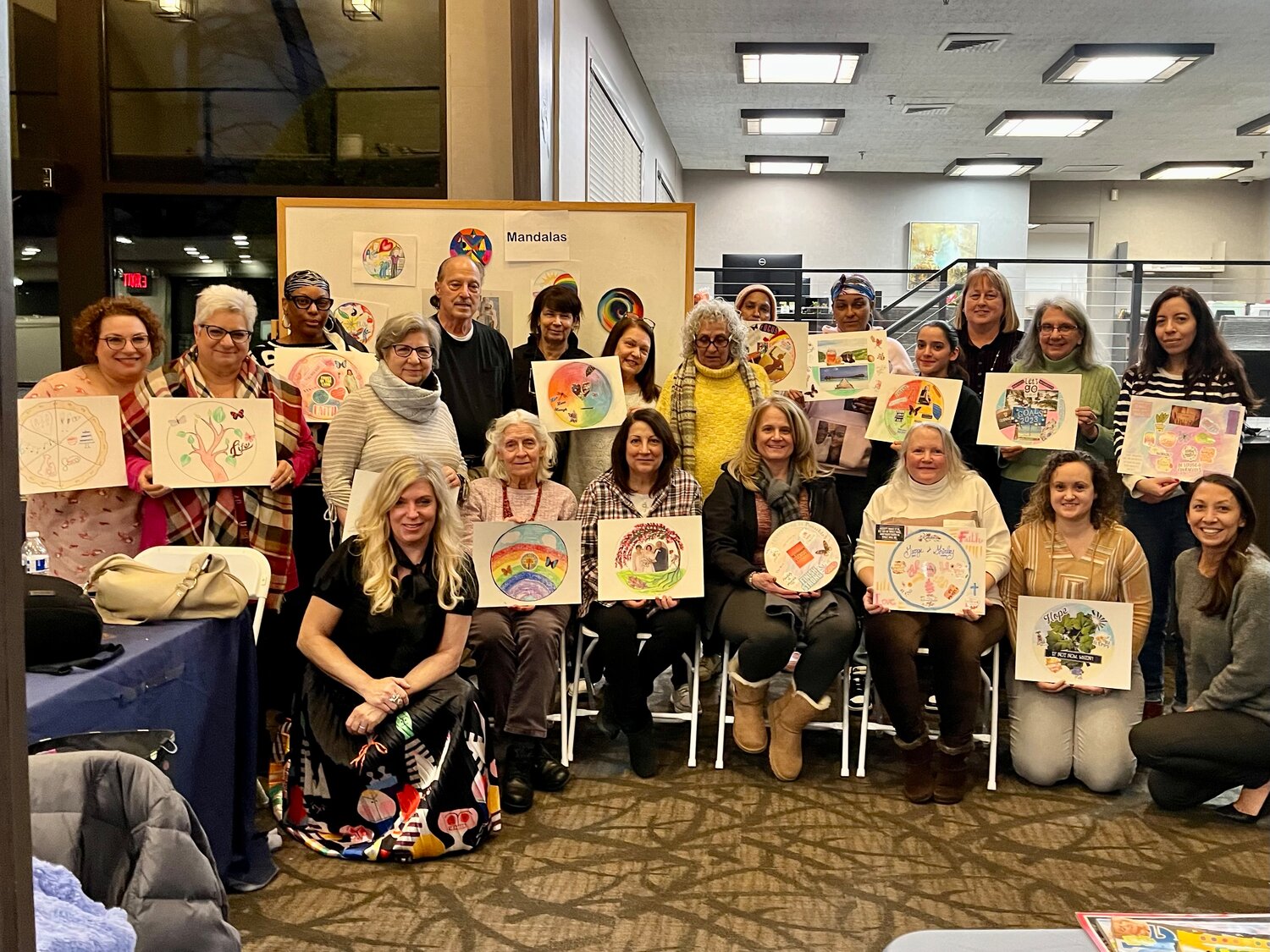Saturday, April 27, 2024
 44.0°,
Mostly Cloudy
44.0°,
Mostly Cloudy
Widow finds way to cope with her loss at Pinelawn
2030 Wellwood Ave., Farmingdale
(631) 249-6100
For further information on Pinelawn’s 2023 calendar of events visit Pinelawn.com/Events/Upcoming-events/
Kathy Quinn-Taylor felt lost after her husband, Robert Taylor Jr., died last July. Her life, she said, has never been the same. Although she continues to appreciate support she’s received from her Glen Cove neighbors and friends, she remains unable to come to terms with being alone.
Because Taylor was buried at Pinelawn Memorial Park and Arboretum, Quinn-Taylor was on the cemetery’s mailing list. One of its mailers caught her attention. Pinelawn was hosting a free mandala-making workshop, inviting people to express their grief for healing purposes. Quinn-Taylor decided to register.
Robert, who was originally from Locust Valley, moved with Kathy, who was living in Queen, to Glen Cove in 2000. Although they were married for only four years, they were friends as well as lovers for more than 30.
Taylor, who was 85, died of complications of the coronavirus, which they were both diagnosed with after returning from a cruise to the Dominican Republic. Although Quinn-Taylor recovered after three days, her husband needed to be hospitalized. He died five days later. Quinn-Taylor remembers being in shock.
“We had our vaccines and boosters and double masked on the plane,” she said. “Everyone we met Bob would ask if they were vaccinated. After he died I was busy with the arrangements, but when everyone left, I looked at the four walls and said now what?”
Quinn-Taylor had never heard of mandala-making but wanted to give it a try. She could not seem to move forward. Even her dog still mourned Robert’s loss.
“To make a piece of art to reflect how I was feeling sounded interesting,” she said. “I went to see what it was like, to meet other people and share my story, and hear how they were grieving. I ended up enjoying it.”
Deborah Adler, a board-certified, registered and licensed clinical art psychotherapist, was chosen to lead the March workshop. Mandala-making, she said, is important because it’s a way of honoring a loved one who has died as well as the person who is in mourning.
“Mandala is a Sanskrit word that means circle,” Adler explained. “Circles often symbolize the connectedness we have with all people, including our lost loved ones. Mandala-making is a powerful art therapy technique that helps people access their inner wisdom, heal their emotional wounds, and celebrate their life journey.”
Workshop participants were given crayons, magazine clippings of photos and words and a round mandala. Everyone worked to create an expression of what they were feeling and their goals. Upon completion, they described the meaning of their mandala for the group.
“One of the first pictures I saw that I used was about travel — we loved to travel,” she said. “These days I can’t imagine getting on a plane without him. We had been going to the Dominican Republic for 20 years and know the people at the hotel. They keep telling me to come back and I just can’t.”
To represent her goals, she glued a picture of a mug of Guinnes onto the circle because the couple always found an Irish pub when traveling. She also included quotes about traveling, which she said sparked her interest to try to move forward.
The workshop was a great experience, but what Quinn-Taylor said was most meaningful was being with people who knew how she felt and hearing their ideas on how to get through grief.
Pinelawn’s free Grief Healing Workshop Series was launched during the coronavirus pandemic to help those mourning the loss of loved ones. Pinelawn hosted 26 grief healing workshops assisting roughly 1,300 people coping with grief. Some of the topics they’ve covered include: “Finding Hope and Purpose After the Loss of Your Partner or Spouse,” “Self-Healing and Resilience Building,” “Rethinking the Holidays After Loss,” “Journaling for Life After Loss,” “Allowing Nature to Hold Us,” and “Healing Through Music.”
Justin Locke, Pinelawn’s president, said funerals changed drastically during the pandemic. He wanted to provide solace to mourners who were unable to experience the typical process of grieving. The pandemic forced people to limit the number of people at a funeral service and they had to stand apart. The entire ordeal was detached, not what people working at Pinelawn were accustomed to, he said.
“Covid made us focus on the fact that people were not able to get together and grieve as they typically had, when there would be a wake, funeral and luncheon afterwards,” he said. “We realized we could do something beneficial.”
In January 2021 Pinelawn began offering the grieving and healing workshops allowing for 25 participants per session. Now 60 to 70 people usually attend, Locke said. He believes the increase in interest is a reflection of people’s need for connectivity, their desire to talk to people who are experiencing a similar loss and a wish to find ways to handle grief.
HELP SUPPORT LOCAL JOURNALISM
The worldwide pandemic has threatened many of the businesses you rely on every day, but don’t let it take away your source for local news. Now more than ever, we need your help to ensure nothing but the best in hyperlocal community journalism comes straight to you. Consider supporting the Herald with a small donation. It can be a one-time, or a monthly contribution, to help ensure we’re here through this crisis. To donate or for more information, click here.
Sponsored content
Other items that may interest you






